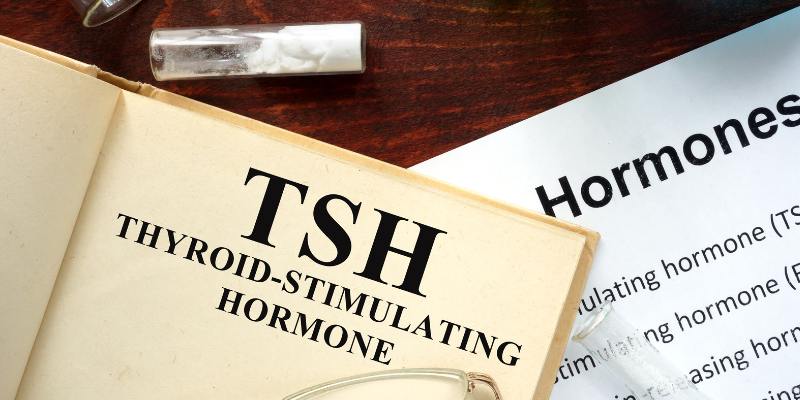We all experience occasional hair loss or fatigue.
But what if these seemingly unrelated symptoms are connected, and the culprit could be your thyroid?
The thyroid gland, a small butterfly-shaped organ in your neck, regulates your metabolism, energy levels, and even hair growth.
When it malfunctions, it can wreak havoc on your entire body, including your hair.

Thyroid 101: Understanding the Master Gland
The thyroid produces hormones that act like chemical messengers, influencing various bodily functions.
The two main thyroid hormones are:
- Triiodothyronine (T3): The active form of the thyroid hormone, responsible for regulating metabolism, energy production, and body temperature.
- Thyroxine (T4): A less active form of the hormone that gets converted to T3 in the body's tissues.
Thyroid Dysfunction: When the Master Goes Rogue
There are two main types of thyroid dysfunction:
- Hypothyroidism (Underactive Thyroid): This occurs when the thyroid doesn't produce enough hormones.
- Hyperthyroidism (Overactive Thyroid): This happens when the thyroid produces too much hormone.
The Hair-Thyroid Connection: Why Your Thyroid Matters for Mane Magic
Both hypothyroidism and hyperthyroidism can affect hair growth in different ways:
- Hypothyroidism: When your body doesn't have enough thyroid hormone, hair follicles slow down their growth cycle. This can lead to hair thinning, dry and brittle strands, and increased shedding.
- Hyperthyroidism: An overactive thyroid can also disrupt the hair growth cycle, potentially leading to hair loss. However, it's often less familiar than hair loss with hypothyroidism.

Beyond Hair Loss: The Domino Effect of Thyroid Issues
Hair loss might be a noticeable symptom, but it's not the only one.
Thyroid dysfunction can cause a cascade of other symptoms, including:
- Fatigue and tiredness
- Weight gain or difficulty losing weight
- Changes in mood and irritability
- Muscle weakness and aches
- Dry skin and brittle nails Irregular periods Intolerance to cold or heat
The Road to Recovery: Getting Your Thyroid Back on Track
If you're experiencing hair loss and other symptoms that suggest a thyroid issue, it's important to see a doctor.
A simple blood test can measure your thyroid hormone levels and diagnose any dysfunction. The good news is that thyroid problems are usually treatable. Hypothyroidism is typically managed with medication to replace the missing hormones.
Hyperthyroidism may involve medication or other therapies to regulate hormone production.
Taking Back Control of Your Health: Hair, Energy, and Beyond
You can get your thyroid function back on track with proper diagnosis and treatment.
This can lead to significant improvements in your overall health and well-being, including:
- Regrowth of lost hair or healthier hair growth
- Increased energy levels and improved mood
- Normalization of weight and metabolism
Relief from other symptoms you've been experiencing hair loss can be distressing.
At Wig Medical, we believe hair loss shouldn't define you.
We empower you to reclaim your confidence and rediscover your beauty. Explore our comprehensive wig selections online, schedule a complimentary consultation with a certified specialist today, or contact us to learn more.
Let Wig Medical be the partner in your journey to renewed confidence.

Five Things You Need to Know about Thyroid Related Hair Loss
Knowledge is key in the challenge of any type of hair loss.
The Wig Medical team wants to ensure you are up to date with what you need to know.
How does the thyroid affect hair health?
The thyroid gland produces hormones that regulate metabolism, energy generation, and overall organ function, including the growth and repair of hair follicles.
An imbalance in these hormones, from hypothyroidism (underactive thyroid) or hyperthyroidism (overactive thyroid), can disrupt the hair growth cycle, leading to hair loss.
What are the signs of thyroid-related hair loss?
Thyroid-related hair loss typically involves uniform thinning across the scalp rather than patchy hair loss.
The hair may become uniformly sparse, and the outer edges of the eyebrows can also thin—a phenomenon known as "Queen Anne's sign."
This hair loss tends to be diffuse, affecting the entire scalp rather than discrete areas.

Can thyroid-related hair loss be reversed?
Yes, in many cases, average hair growth can resume once the thyroid disorder is effectively treated.
Hair loss associated with thyroid diseases is usually temporary.
Still, it may take several months for the hair to begin regrowing and regain its normal fullness after the appropriate medication regime stabilizes the thyroid levels.
What treatments are available for thyroid-related hair loss?
The primary treatment for hair loss due to thyroid issues is appropriately treating the thyroid imbalance.
This may involve: Thyroid hormone replacement therapy for hypothyroidism. Medications to reduce thyroid hormone production or remove excess hormones for hyperthyroidism.
Dietary adjustments and supplements, like selenium and zinc, can help support thyroid function and overall hair health.
What should I consider when choosing a cranial prosthesis if I have thyroid-related hair loss?
While your thyroid levels are being adjusted and your hair is regrowing, a cranial prosthesis can be a great option to improve your confidence and appearance.
Consider the following when choosing a medical wig:
- Material: Look for natural, breathable materials that won’t irritate your scalp.
- Fit: Ensure the prosthesis fits well and doesn't put excessive pressure on any part of the scalp, which could interfere with regrowth.
- Style: Choose a style you feel comfortable with, which can significantly impact your overall well-being and confidence.
- Maintenance: Opt for a wig that is easy to care for, especially if you are dealing with ongoing health issues.
Have something else to add about the topic?
We would love to hear. Drop us a message in the comments below.

